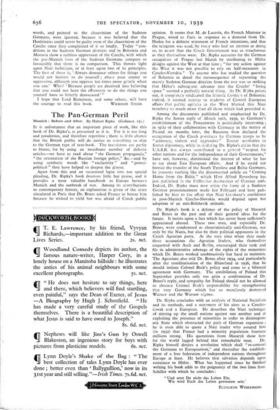The Pan-German Peril
Munich : Before and After. By Hubert Ripka. (Gollancz. Ifs.)
IT is unfortunate that an important piece of work, like this book of Dr. Ripka's, is presented as it is. For it is too long and ponderous, and therefore repetitive ; there is little chance that the British public will do justice to something so akin to the German type of text-book. The translators are partly to blame, for by using an inordinate number of definite articles—we have to read about "the German propaganda," " the orientation of the Russian foreign policy," &c.—and by using synthetic words like " exclusivity " and " power- political " they have helped to deepen the gloom.
Apart from this and an occasional lapse into too special pleading, Dr. Ripka's book deserves little but praise, and it provides a most valuable handbook to Europe between Munich and the outbreak of war. Among its ccntributions to contemporary history, an explanation is given of the story circulated in Paris that Dr. Benes asked France to betray him because he wished to yield but was afraid of Czech public opinion. It seems that M. de Lacroix, the French Minister in Prague, wired to Paris in response to a demand from Dr. Hodza for a definite statement of French intentions, and that the telegram was used, by thole who had an interest in doing so, to assert that the Czech Government was as treacherous as they themselves were. Dr. Ripka accounts for the German occupation of Prague last March by attributing to Hitler designs against the West at that time ; " for any action against the West it was not possible to rely on half-measures in Czecho-Slovakia." To anyone who has studied the question of Bohemia in detail the inconsequence of separating the mainly Sudeten German districts from the rest was so striking that Hitler's subsequent advance into the Czechs' " living space" seemed a perfectly natural thing. As Dr. Ripka points. out,. it completely vindicated the historic frontie-s of Bohemia; indeed, it seemed strange to students of Central European affairs that public opinion in the West blamed this Nazi treachery so much more than all those which had preceded it.
Among the documents published and emphasised by Dr. Ripka the Soviet reply of March 19th, 1939, to Germany's establishment of the Protectorate is particularly interesting ; in spite of their collaboration with Germany in the matter of Po:and six months later, the Russians then declared the occupation of the Czech prcivinczs by German troops to be "arbitrary, violent and aggressive." Recent acrobatics in Soviet diplomacy, while invalidating Dr. Ripka's claim that the U.S.S.R. has always contributed to a general "respect for other nations and for the independence of their Governments," have not, however, diminished the interest of what he has to say about East European affairs. And if he could not foresee the transfer of the South Tyrolese and Baltic Germans, he presents nothing like the disconcerted article on " Coming Home from the Baltic " which Herr Alfred Rosenberg has just published in the Volhifcher Beobachter of October aoth. Indeed, Dr. Ripka must now enjoy the irony of a Sudeten German pronouncement made last February and here pub- lished by him to the effect that Nazi Germany's confidence in post-Munich Czecho-Slovakia would depend upon her adoption of an anti-Bolshevik attitude.
Dr. Ripka's book is a defence of the policy of Masaryk and Benes in the past and of their general ideas for the future. It insists upon a fact which has never been sufficiently appreciated abroad. These two men, and especially Dr. Benes, were condemned as chauvinistically anti-German, not only by the Nazis, but also by their political opponents in the Czech Agrarian party. At the very time when they made these accusations the Agrarian leaders, who themselves coquetted with Asch and Berlin, encouraged their rank and file in administrative sabotage of the rights of the minorities which Dr. Benes worked unobtrusively but hard to maintain. The Agrarians also told Dr. Benes after 1934, and particularly after the remilitarisation of the Rhineland in 1936, that he should imitate Colonel Beck's policy and come to a bilateral agreement with Germany. The annihilation of Poland this September provides only too grim a confirmation of Dr. Benes's reply, and sympathy for Poland should not be allowed to obscure Colonel Beck's responsibility for strengthening that very Germany which has so mercilessly destroyed Warsaw and the Warsaw regime.
Dr. Ripka concludes with an analysis of National Socialism and its methods, and a statement of his aims as a Czecho- slovak and a European. He describes the Nazi technique of stirring up the small nations against one another and of exploiting the presence of minorities in order to disintegrate any State which obstructed the path of German expansion ; he is even able to quote a Nazi leader who assured him (in 1932) that France had a minority population fourteen millions strong. His quotations from Masaryk show how far the world lagged behind that remarkable man. Dr. Ripka himself desires a revolution which shall " re-convert the Germans to Europeanism," and thereafter the establish- ment of a free federation of independent nations throughout Europe at least. He believes that salvation dependt upon resistance to Hitler. What has happened since he finished writing his book adds to the poignancy of the two lines from Schiller with which he concludes: " Und setzt Ihr nicht das Leben Wie wird Euch das Leben gewonnen sein.'
ELIZA3ETH WISKEMANN.




































 Previous page
Previous page